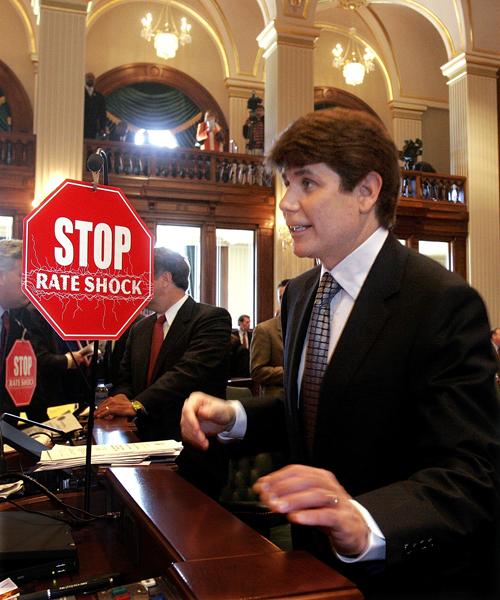Blagojevich offers big plans backed by big tax hikes

Illinois Gov. Rod Blagojevich stops to speak to members on the Democratic side of the House chambers after delivering the State of the State address to a joint session of the General Assembly at the Illinoios State Capitol in Springfield, Ill., Wednesday, The Associated Press
Mar 7, 2007
Last updated on May 12, 2016 at 08:39 a.m.
SPRINGFIELD – Illinois would see the largest tax increase in its history under Gov. Rod Blagojevich’s plan to provide health care for the uninsured and ramp up state support for education.
Blagojevich is presently revealing his budet proposals as he delivers his 2007 State of the State address. Blagojevich is set to call for leasing the state lottery to a private contractor and borrowing billions of dollars in a bid to solve the state’s most pressing financial problem _ pension systems soaking up more and more of Illinois’ tax money.
“The choice is simple: We can let the pension challenge worsen or have corporations pay their fair share,” he said in his 33-minute State of the State address.
Even before the speech, business groups were organizing to oppose Blagojevich’s call for $7 billion in new corporate taxes. The biggest tax would apply to every type of business transaction, from auto sales to medical care.
Get The Daily Illini in your inbox!
His education plan also could face trouble, since it would do nothing to address calls for a fundamental change in the way Illinois pays for education.
Blagojevich said little about the surge in electric prices that has angered so many consumers. He said he’s eager to sign legislation protecting consumers, but he didn’t spell out what the legislation should do or demand that lawmakers take action.
In all, Blagojevich’s budget calls for a record $60.1 billion in spending, a 9.5 percent increase over the current year.
Blagojevich presented a sweeping proposal to make health insurance available to anyone who wants it, an idea he calls “a moral imperative.” The Democratic governor says 1.4 million Illinoisans, including many working people, cannot afford insurance now.
He called on lawmakers to support “Illinois Covered,” his $2.1 billion plan to offer free coverage to the poor and subsidize coverage for the working poor and middle class. The administration says the plan would cost about $280 million the first year.
Blagojevich also proposed increasing education spending by $1.5 billion, a jump of about 23 percent. That would be accompanied by a $1.5 billion program to help districts build new schools and repair old ones.
He continues to resist calls _ some of them coming from his legislative allies _ to change an education system that relies heavily on property taxes, which vary sharply from district to district.
Blagojevich would pay for his proposals with new business taxes he says would not hurt the economy or cause serious pain for consumers. Small businesses would be exempt, and manufacturers would pay a lower rate than service businesses.
Still, business groups predict severe consequences.
“No one should be fooled _ consumers are going to pay this tax. What’s he thinking?” Greg Baise, president of the Illinois Manufacturers’ Association, said in a twist on the campaign theme that helped Blagojevich win a second term.
Republican lawmakers laughed when Blagojevich described himself as pro-business.
Democrats were generally the only ones to applaud during the speech, usually when Blagojevich mentioned increased support for education or health care.
Blagojevich won re-election partly because of his promise not to raise taxes. His aides said this budget does not break that promise because the governor specified that his pledge applied to the income and sales tax. In addition, his proposed increases apply to businesses, not individuals.
No matter what kind of taxes, they still add up to the largest increase in Illinois history. A new “gross receipts tax” on business transactions would produce about $6 billion a year, while a new payroll tax would generate an additional $1 billion.
By comparison, Illinois took in only $1 billion from the first full year of the income tax, back in 1971.
Blagojevich presented the gross receipts tax as a way to modernize the state’s tax system and make it more fair.
“This will close corporate loopholes, give the middle class the tax relief they need and allow us to meet our needs on schools, health care and pensions,” he said.
The administration argues many businesses pay little or no income tax, and the growing service sector of the economy is under-taxed, too. Taxing gross receipts would reach companies that now escape some taxes and also would apply to services, such as legal advice.
Blagojevich proposed a major attack on the state’s problem of retirement systems that need more money to pay future benefits.
State workers, university employees, downstate teachers and more have been promised billions of dollars worth of benefits, but the state hasn’t put aside nearly enough money to pay for them. The gap, known as “unfunded liability,” topped $42 billion at the end of the last budget year _ the worst mark in the country.
Ultimately, the state must pay. That means closing that gap will eat up a bigger and bigger share of state revenues. The last two years, Blagojevich and lawmakers simply cut back pension payments rather than pay the required amounts.
Now Blagojevich proposes privatizing the lottery, something he predicts will bring the state $10 billion. He also wants to borrow $16 billion at lower interest rates and pay off part of the pension debt, which is growing at an 8.5 percent rate.
The $26 billion from those two actions would make a huge dent in the pension gap, saving the state money and reducing the drain on scarce dollars, he said.





